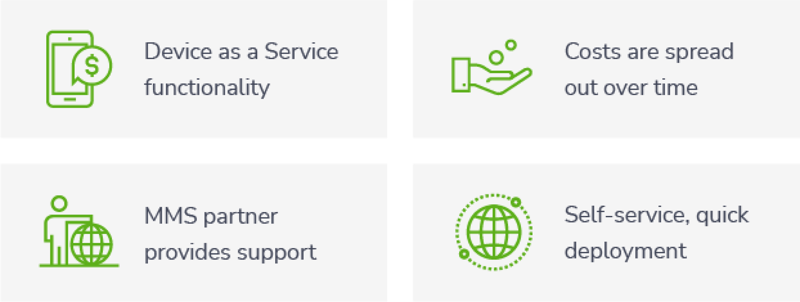Introduction
Today’s enterprise needs to empower their people to work productively. Remote, hybrid, and flexible working have become commonplace in the corporate world, and people want to work from anywhere with access to the right technology. But achieving this has consequences on your enterprise communications.
90% of C-suite executives think that employees have access to the right technology, but only 53% of staff agree. Changing work environments mean that your employees have higher demands for the technology they use, and the desire for better mobile capabilities is on the rise.
If you’re a global organization with thousands of employees, all with a range of mobile device needs, it can be a challenge to manage expectations. All while maintaining effective control and keeping costs down across your IT infrastructure.
Managed Mobility Services

A managed mobility services (MMS) provider will assist you with the procurement, deployment, and management of all IT and business process services for your mobile devices and related systems. This includes smartphones, tablets, equipment, or wearables. Any device that accesses your corporate network is covered, including those within the perimeters of a Bring Your Own Device (BYOD policy.
The biggest benefit of managed mobility services is that it’s end-to-end. Experts are on-hand to assist you with everything from:
- Strategy
- Procurement
- Provisioning
- Activation
- Management
- Security
- Support
- Eventual device recycling or disposal
An expert partner optimizes the processes with your managed mobility services lifecycle by minimizing costs and turning your global mobility network functions into a well-oiled machine. This reduces pressure on your internal teams and gives end-users a better experience. They can get their hands on the right devices, faster.
Enterprise Mobility Trends

It’s never been more important to have control of your enterprise mobility. The world we operate in continues to change at a rapid pace. Remote and hybrid working means organizations need to do more to enhance their mobile support. Here’s why.
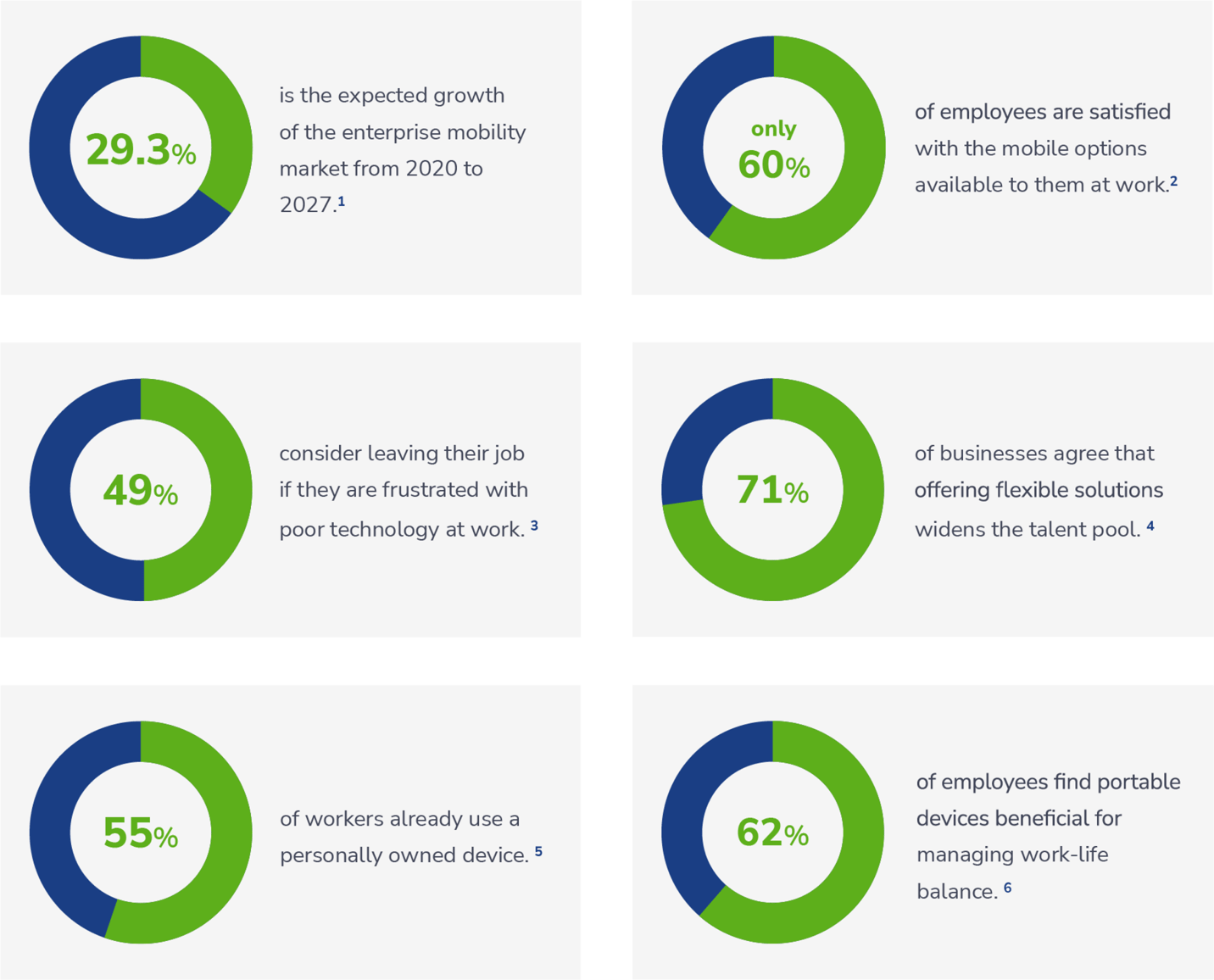
1. Allied Market Research, Enterprise Mobility Market Size, Trends, and Forecast, https://www.alliedmarketresearch.com/enterprise-mobility-management-market, 2020
2. PwC, Tech at Work and Employee Experience, https://www.pwc.com/us/en/services/consulting/library/consumer-intelligence-series/tech-at-work.html
3. Adobe Experience Cloud, The 2021 State of Work, https://business.adobe.com/uk/resources/reports/state-of-work.html, 2021
4. IBM, What is a Mobile Workforce?, https://www.ibm.com/topics/mobile-workforce
5. Gartner, Press Release, https://www.gartner.com/en/newsroom/press-releases/2021-04-26-gartner-survey-finds-1[…]consider-themselves-digital-technology-experts-since-covid-19, 2021
6. CIPD, Workplace Technology Report, https://www.cipd.co.uk/Images/workplace-technology-2_tcm18-80853.pdf, 2020
What Enterprises Need
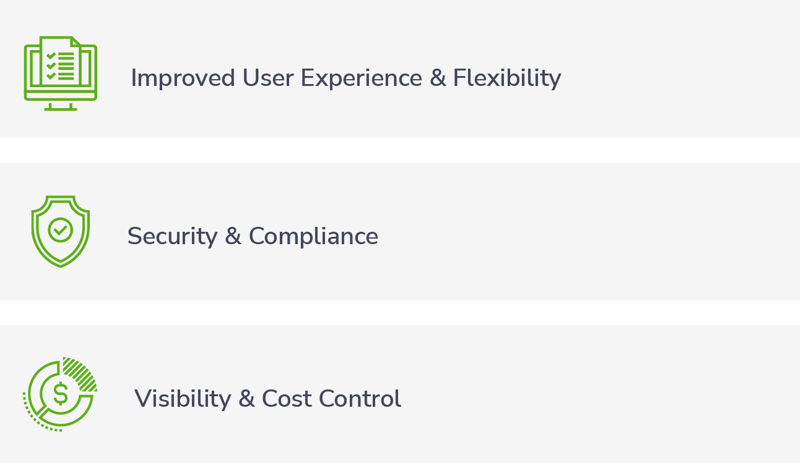
Many workers might be using personal devices without the explicit consent of your IT department to access corporate networks. Or, they might be using a device covered by your BYOD policy, or a corporate-provided device. You need methods of securing who and what accesses your corporate network across a vast range of employee access points. And you require visibility of how much you’re spending on your entire mobility environment.
Additionally, demand for the latest technology, improved end-user experience, and increased flexibility will be key differentiators of employee satisfaction.
Managed Mobility Services: Everything You Need to Know

Find out exactly how managed mobility services work, and how they can support your enterprise.
Financial Management
A managed mobility services partner consolidates all of your mobile expense management data into one, secure platform for improved financial management. This provides unique insight into your mobile estate that’s used to optimize processes.
Your data is managed in real-time, enabling better auditing and financial reporting, so you can accurately see what’s truly going on in your mobility environment. With this level of control, you’re better positioned to understand where hidden costs are coming from.
Global enterprises see long-term results when their MMS partner identifies, implements, and monitors cost control measures during the entire lifecycle of devices. Whether it’s disputing a billing error or seeking cost reduction opportunities – a managed mobility services provider is always working to minimize your spending.
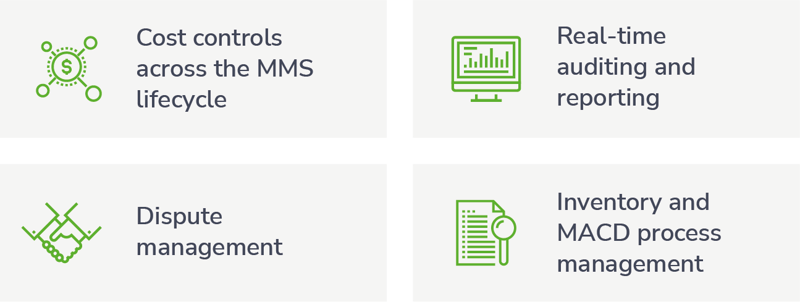
Provisioning and Device as a Service
An MMS partner can automate your enterprise device provisioning. When an employee or department needs to get access to a specific or new device, such as the latest iPhone, they can access the easy-to-use self-service portal and manage the process themselves. This way, you get devices to your employees faster, all without putting extra manual effort on your internal teams.
And the benefits of this become greater as your demand scales. If your business wants to upgrade its entire fleet of devices globally, it could be a costly effort. A managed mobility services partner can work with you to acquire the latest devices at the best possible price.
Device as a Service from Cass
Device as a Service (Daas) lets you own the latest devices without an immediate upfront purchase. The costs of the devices are combined into monthly payments as part of your existing MMS service fees. You get the technology you need instantly, all with a single-step solution.
Learn more about the unique benefits of Device as a Service from Cass.
Managed Unified Endpoint Management
Dynamic organizations need people working in multiple locations. And even in an office environment, your mobile devices need to function on a secure mobile ecosystem that doesn’t compromise security.
Managed unified endpoint management (UEM) as part of managed mobility services gives you global control of devices across your network.
This is all managed from a single location so that corporate data is secure.
UEM lets you self-activate devices and assign access based on ownership, or remotely lock or wipe data when you need. You can assign administrative privileges and manage network access controls to make sure all employees only have access to what they need. You can also deliver policies and security updates to your entire network of mobile users in real time.
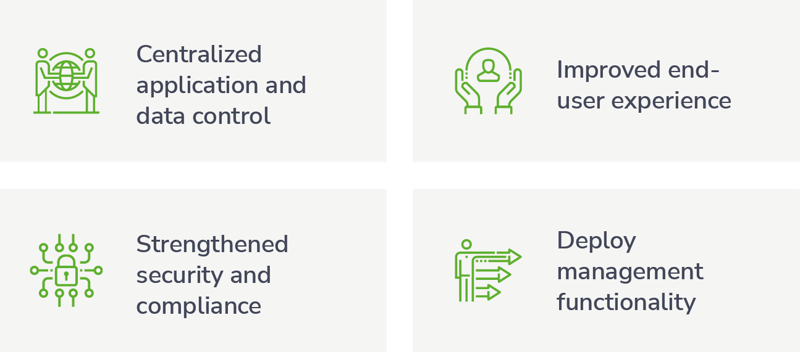
Sourcing and Logistics
Global supply chains, local laws, currencies, languages, negotiations, repairs, and eventual recycling or resale are all pain points for organizations that, ultimately, need to make sure employees have the devices they need. It can take years to gain the experience needed to manage sourcing and logistics correctly on a global scale. And even if your teams aren’t lacking in experience, staying up to date with the latest, competitive information is difficult.
A managed mobility services provider takes control of your mobility lifecycle. Managed mobility services ensure devices are sourced, deployed, and retired maturely. This covers everything from sourcing, contract negotiation, forward and reverse logistics, staging and kitting, and the end-of-life stage of your mobile devices.
Most importantly, a managed mobility services provider has established industry relationships that strengthen your negotiating position with suppliers. They work hard to implement the most competitive strategy for your mobility lifecycle and optimize supply chain management too.
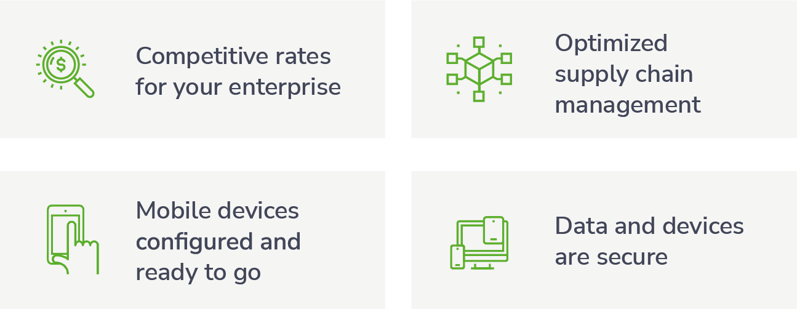
Bring Your Own Device and Bring Your Own Network
Empowering employees to work how they want is key to improving the end-user experience. A Bring Your Own Device (BYOD) policy can enable this, providing greater flexibility and freedom to staff while maintaining control of data governance. However, your BYOD policy mustn’t become a costly burden or introduce security risks.
A managed mobility services provider handles financial processes like BYOD reimbursement for you. Instead of indirect reimbursement through your employee payroll or expense reporting, credit can be transferred directly to your employee's mobile phone account. Solutions like Direct2Carrier Payments™ let your MMS provider directly credit employees’ personal wireless bills with the appropriate BYOD reimbursement amount. This is a pre-approved amount for employer reimbursement, so the process is straightforward for both you and the employee.
Additionally, a managed mobility services provider integrates your BYOD program with a mobile device management solution, so your organization remains compliant and stays on track of employee-owned devices that access your corporate network. What's more, your managed mobility services provider can help you set up a Bring Your Own Network (BYON) program. This allows your employees to use their personal broadband network to access and support their work at home.
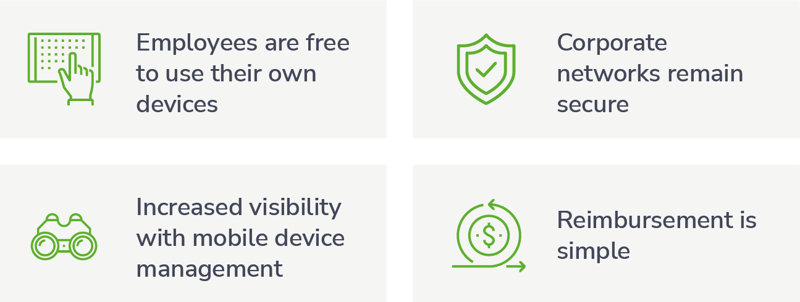
Program Management and Support
Managing a fleet of global mobile devices is a full-time role. It requires 24-hour, 365 days a year coverage that transcends language, currencies, and cultures. It’s pivotal to support end-users in real-time, no matter where they are in the world. Not doing so can reduce employee satisfaction, and impact productivity.
A managed mobility services partner provides comprehensive program management and support, with a global end-user help desk for your employees. They offer dedicated support for technical issues that address your staff’s specific needs. If your managed mobility services provider operates on a global scale, they’ll have in-region resources across the world, so it's easy for your end-users to get assistance during their working hours.
And these regional experts can support account management, too. Managed mobility services provide a liason for your global relationships in the form of a regional account manager. They’ll have the time and knowledge to get to know third-party providers or end-users on a local level so that your enterprise is credible and trusted on a global scale.
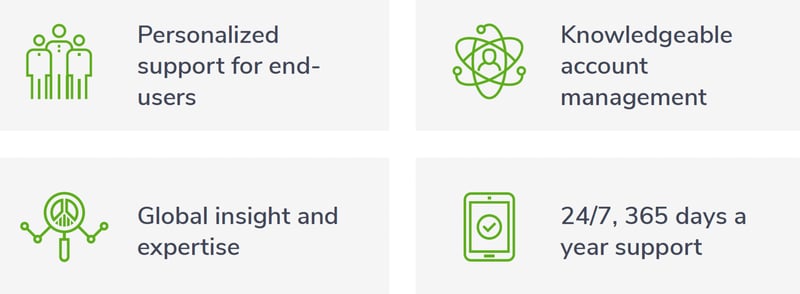
The Key Benefits of Managed Mobility Services

Optimize Your Global Workforce
The enterprise workforce continues to evolve. Employees are more responsive to hybrid working policies than ever.
Managed mobility services can strengthen your mobile device management so you can prepare for the future. You can access the right devices quickly, respond to change, and continually improve the end-user experience.
Manage Costs
Your corporate networks might only be accessible to corporate-issued devices. Or, it might only be accessed by employee-owned devices. Or it could be a combination of both. Staying on track of the expenses, charges, and software is challenging without a single source of data.
Managed mobility services consolidate your expenses, globally, into a single platform – providing unprecedented visibility.
Stay Secure and Compliant
Mobile devices can make your corporate networks vulnerable. Especially when end-users are no longer accessing it from one location.
UEM is pivotal to remain in control of who, what, and how end-users access your data. It gives employees the freedom to work how they want, without compromising security.
